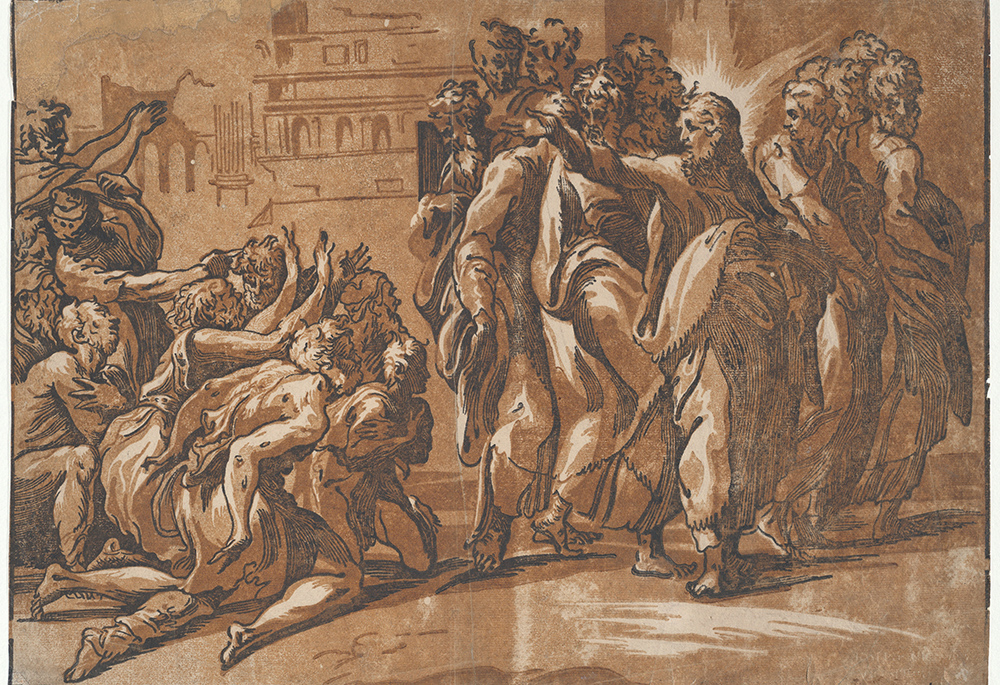
"Christ healing the Lepers," a circa 1540-50 print by Niccolo Vicentino, after Parmigianino (Girolamo Francesco Maria Mazzola) (Metropolitan Museum of Art)
How would you have felt in Ezekiel's sandals? First, God sent him a vision of frightful, four-faced creatures who appear out of a terrifying storm. When that knocked him off his feet, the Spirit of the Lord exhorted him to stand up like a man and preach to the Israelites in exile. The Spirit made no secret about Ezekiel's chances for success: God described his intended audience as rebels, hard of face and obstinate of heart. The only thing that seemed important to God was that Ezekiel would warn the people, no matter the outcome.
Today, Mark demonstrates how Jesus' career mirrored Ezekiel's. Preaching at home put Jesus in front of his most critical audience. His people had seen him grow up and expected nothing more of him than they did of themselves.
Why did they take offense at him? According to Mark, it was their lack of faith. They didn't/couldn't/wouldn't believe. What did they find beyond belief? John's Gospel quotes Nathanael (John 1:46) as hitting the nail on the head by asking, "Can anything good come out of Nazareth?" The townspeople's lack of faith wasn't just about Jesus, perhaps not even mostly about Jesus. The real question was, "Can anything good happen among us?"
Ezekiel's Israelites were stubborn; Jesus' people seemed more jaded than hardhearted. They knew they were lightweights on the national scale (the Times of Israel called ancient Nazareth a "one-camel town.") They worried about what might happen to them because of the crazy local guy performing God knows what sort of signs and proclaiming that God's reign was alive among them. Was he looking for trouble? Was he blind to the real world?
Believing in the "real world" may be the greatest stumbling block there is when it comes to faith. It's fairly easy to say, "I believe in the resurrection of the dead and life everlasting," largely because we don't really know what it means, and the belief requires nothing of us. But before we proclaim that God is now reigning among us, we want some evidence — and our perception of the "real world" may leave us blind to the evidence we seek.
Mark reported that Jesus accomplished very little in Nazareth. That must have hurt even more than when only one of the 10 cured of leprosy thanked him. Ezekiel might have appreciated a 10% success rate, but who among us would give our lives to a venture that promised so little?
Yet, that's what God has done from the moment of creation. God set a universe (and more) in motion, endowing us with the freedom to develop as we would. According to Jesus, God's hope has always been that we would choose to enhance our natural union with one another and with God. God created us with the potential to do so, but not everyone (more or less 10%?) believes in or wants to take up God's offer.
Advertisement
Ezekiel had two messages. First, he told the unfaithful people that they were responsible for their own unhappy fate. The second was that God was ready to rebuild with them. It often seems easier to deal with the first than the second; penance demands less than accepting Jesus' invitation to collaborate with God's reigning among us.
Doing penance and denouncing evil allow us to wallow in despondency and to feel righteous by calling out the wickedness around us. Jesus' invitation is far more challenging. Jesus insists that God is reigning in the universe. He promises that we can get caught up in God's reigning if only we are open to do so.
Jesus calls us to metanoia, a new, wildly open mindset that focuses more on possibility than on mistakes. When we are captivated by that, we become impelled to action on behalf of God's reigning — to recognize it, to revel in it and to do all we can to invite others into it. That's a much bigger responsibility, and a much more pleasant activity, than denunciation.
Now, in the middle of summer 2024, it's easy to focus on signs of disaster all around us. Today's Gospel suggests when we do so, God is amazed and saddened at our lack of faith. When we refuse to believe in the overwhelming strength of goodness and love, we stand in firm solidarity with the people among whom Jesus could accomplish very little.
We aren't called to save the world — God has taken care of that. Our call is to be part of the 10% who believe in God and in God's faith in us. If we have the courage to believe, we can be the ones to stand up and announce good news in such a way that others begin to believe. The potential of 10% has proven itself for the past 2,000 years.




